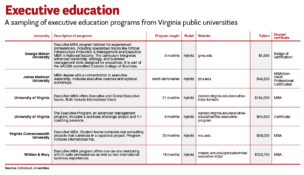Va. Tech alum donates $35M, largest single gift in school history
Wendy and Norris Mitchell's gift will go toward new engineering building
Robyn Sidersky //December 7, 2021//
Va. Tech alum donates $35M, largest single gift in school history
Wendy and Norris Mitchell's gift will go toward new engineering building
Robyn Sidersky //December 7, 2021//
The largest single gift ever made to Virginia Tech, $35 million, comes from a man who grew up without running water or electricity.
The university announced the gift from Norris and Wendy Mitchell Tuesday.
Norris E. Mitchell, a 1958 graduate of Virginia Tech, and his wife, Wendy, committed $35 million to Virginia Tech, the largest single-donor gift ever made by an alumnus, according to the university. It will go toward a long-awaited project to replace 60-year-old Randolph Hall, a building primarily used by the engineering college, with a 284,000-square-foot building for the engineering college, as well as providing support for programs and activities housed within the building. The total cost of the project is $248 million and the gift from the Mitchells satisfies the university’s obligation to provide funding to the project, according to a university spokesman. The remainder of the funding could come from the commonwealth after approval from the General Assembly, which it would be eligible for in the GA’s 2023 session. If approved, the funding would come in summer 2023 and that’s when construction would start.
The Mitchells live in Great Falls. But the hours-long drive doesn’t stop them from regularly visiting the Blacksburg campus where they both studied.
During a 2019 visit to campus, the couple met with students from the Croton Department of Aerospace and Ocean Engineering. It made a strong impression on them and helped cement their decision to give toward the project to replace Randolph Hall, according to Tech.

Norris Mitchell started his education at the University of Lynchburg, but transferred to Tech after securing a cooperative education appointment with the U.S. Navy. He took classes in Blacksburg in the fall and spring, and worked collecting data on flight tests for the Navy during the winters and summers, according to Tech. The work sparked an interest in missiles and rockets, which became the focus of his career.
After earning an aerospace engineering degree, Mitchell worked for Douglas Aircraft Co., which later became McDonnell Douglas, ultimately merging with The Boeing Co. While at Douglas, he became the chief of the company’s aerodynamics program, but later left to work for Science Applications International Corp. (SAIC).
But then Norris Mitchell turned his attention to real estate. He first dipped his toe into the world of real estate by buying an apartment building with friends in 1968, 10 years after graduating from Tech. Over time, he became more invested in real estate, leaving aerospace engineering and making real estate his career in 1974 with the founding of MG Apartments. Through his company, he owns close to 1,000 apartments and townhouses in the mid-Atlantic. He also helped start Virginia Commerce Bank, which merged with United Bank. Another project in his repertoire: purchasing and upgrading the Olde Mill Golf Resort in Carroll County.
The $35 million gift is not the first time that Virginia Tech has been the beneficiary of donations from the Mitchells, who are members of the university’s Ut Prosim Society, which requires a minimum donation of $100,000, according to Tech’s website. Norris Mitchell endowed the Mitchell Professor of Aerospace and Ocean Engineering position, now held by Rakesh Kapania, and a scholarship in the Kevin T. Crofton Department of Aerospace and Ocean Engineering. A robotics lab in the College of Engineering’s Goodwin Hall is also named for the Mitchells in recognition of their philanthropy.
But being able to give so generously wasn’t always the case for Norris Mitchell. He grew up in rural Carroll County, however being without modern amenities didn’t stop his drive to go to college. His mother emphasized the value of education in the one-room schoolhouse where she taught him early in his life. He earned a scholarship to Virginia Tech.
“Growing up, it was always a question of where I would go to college, not if,” Mitchell has said. “Same with my brother and two sisters.”
He also didn’t see his circumstances as a disadvantage.
“When you live in the country and don’t have electricity or water or so forth in the house, you become very self-sufficient,” he said in a statement. “You learn how to do a lot of things that other people don’t know how to do.”
g


















